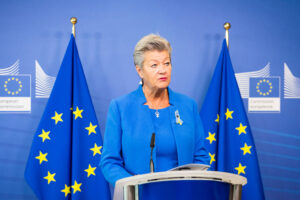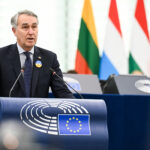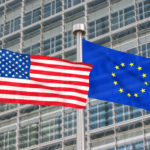The member states on Friday adopted a proposal by the Commission.
On Tuesday, the Commission had presented its proposal for a freeze of the application of the 2007 Visa Facilitation agreement with the Russian Federation regarding the issuance of tourist visas. The days later, it was adopted by the Council of Foreign Ministers. As a consequence, Russian nationals will no longer benefit from a simplified procedure to enter the EU territory. This could severely reduce the number of Russian visitors to the 27 EU member states.
“The European Union has concluded visa facilitation agreements only with a selected and limited number of third countries. Such agreements are to be a proof of mutual partnership between the EU and the given country and are based on the mutual respect of common values”, states the draft proposal. This comes after the partial suspension of the Visa Facilitation agreement a day after Russia’s invasion of Ukraine.

Press point by Ylva Johansson, European Commissioner, on proposals to suspend the EU-Russia Visa Facilitation Agreement and on non-recognition of Russian travel documents issued in occupied foreign regions. Aurore Martignoni/© European Union, 2022
“A country like Russia, waging a war of aggression, should not qualify for visa facilitations as long as it continues conducting its destructive foreign policy and military aggression towards Ukraine, demonstrating a complete disregard to the international rules-based order”, said Ylva Johansson, EU’s Commissioner for Home Affairs during a press conference. The suspension of the visa agreement means that Russian citizens will no longer enjoy privileged access to the EU and face a lengthier and more expensive visa application process. According to the Council, it will result in an increase in the visa application fee from €35 to €80, the need to present additional documentary evidence, increased visa processing times and more restrictive rules for the issuance of multiple-entry visas.
Member states will be given wider discretion in processing short-stay visa applications from Russian citizens and will be able to ensure more scrutiny with respect of Russian nationals traveling to the EU. Nonetheless, the Commission stressed, the EU would remain open to certain categories of Russian visa applicants traveling for the purpose of visiting family members of EU citizens. Journalists, dissidents, and civil society representatives will also continue to enjoy easier access to the EU territory.
“A visa facilitation agreement allows privileged access to the EU for citizens of trusted partners with whom we share common values. With its unprovoked and unjustified war of aggression, including its indiscriminate attacks against civilians, Russia has broken this trust and trampled on the fundamental values of our international community. Today’s decision is a direct consequence of Russia’s actions and further proof of our unwavering commitment to Ukraine and its people”, said Vít Rakušan, Minister of the Interior of the Czech Republic which currently holds the rotating presidency of the Council.
The decision is to be published in the Official Journal on 9 September 2022 and will apply as of 12 September 2022.
Aggression against Ukraine and passports issued in occupied regions
The Commission also presented a proposal on the non-recognition of Russian passports issued in areas of Ukraine recently occupied by Russian forces.
In the explanatory memorandum that is part of the proposal, it is stressed that “Since the Member States have not recognised the illegal annexation of the Autonomous Republic of Crimea and the city of Sevastopol by the Russian Federation or of other Russian–occupied regions in Ukraine, travel documents issued by the Russian authorities in these territories have generally not been recognised by the Member States for the purposes of issuing of a visa and of crossing the external borders. The same applies to the travel documents issued in the Russian–occupied Georgian territories of Abkhazia and South Ossetia. These positions are reflected in the table of recognised travel documents issued by third countries, which the Commission frequently updates, based on Member States’ notifications.”
On 31 August, the 27 had already agreed in principle on the measure. Earlier, several of the Baltic states with borders to Russia raised the issue. Finland’s Prime Minister Sanna Marin was one of the first politicians to propose the ban. “It is not right that at a time when Russia is waging an aggressive, brutal war of aggression in Europe, Russians can live a normal life, travel in Europe, be tourists”, she said in August.
The agreement between the EU and the Russian Federation on the facilitation of the issuance of visas to the citizens of the European Union and the Russian Federation entered into force on 1 June 2007. It provided for the mutual facilitation of tourist visas. Talks over a successor agreement were suspended in 2014, following Russia’s annexation of Crimea.
It is unclear if Moscow will now retaliate and make travel for EU citizens to Russia more difficult.
Author: Michael Thaidigsmann






